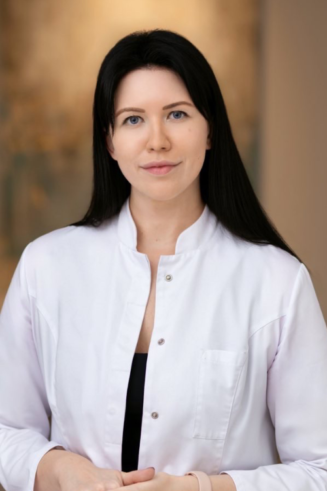PRP therapy is a skin treatment with platelet-rich plasma. During the procedure, the healing potential of the patient’s blood is used to rejuvenate skin cells.
This natural therapy stimulates the production of collagen, elastin, keratin and the formation of new capillaries. It rejuvenates the skin of the face, neck, décolleté, hands and elbows without surgical intervention and chemical treatments. The procedure is also suitable for correcting postoperative scars, acne scars, and stretch marks.
PRP therapy is exceptionally recommended for patients aged 30-35.
Who is PRP therapy suitable for?
This treatment is suitable for everyone who wants to rejuvenate their skin, as PRP can:
- smoothen out wrinkles;
- reduce skin irregularities;
- add more brightness and elasticity to the skin;
- decrease pigmentation;
- evened out scars;
- reduce stretch marks.
PRP therapy can also be used to stop hair loss and strengthen hair follicles.
In which cases is PRP therapy not performed?
Individuals are advised against PRP therapy if they:
- have infectious diseases;
- have blood clotting disorders or are taking blood-thinning or immunosuppressive drugs;
- are suffering from anaemia;
- have a low platelet count;
- are suffering from some chronic diseases (e.g.: diabetes, chronic hepatitis, multiple sclerosis);
- have oncological diseases.
In addition to this, PRP therapy is not performed during pregnancy and breastfeeding.
Do you need special preparation for the PRP therapy?
PRP therapy does not require special preparation, but we strongly recommend blood tests before starting your course of procedures.
The blood test results help ensure that PRP therapy will be effective, as it uses the patient’s blood to prepare the high-quality platelet-rich plasma required for the PRP injections.
How does the PRP procedure work?
PRP skin rejuvenation procedures are safe and quick. First, blood is taken from the patient’s vein for the procedure (usually no more than 8 ml). The blood, placed in a special container, goes to the centrifuge.
The device will take about 5 to 10 minutes to separate plasma with platelets from the red blood cells, producing a high concentration of platelets with plasma, 4 to 5 times higher than the regular number of platelets in the blood. Then, the concentrate is injected into the intended places with a very thin needle.
An important nuance: we perform PRP procedures with a hypodermic syringe, not a mesogun. There are several reasons for this choice. First, the doctor uses the needle to control better the amount and depth of the injected product in the skin. In addition, when performing the procedure manually, product loss is avoided, and more of it is injected into the skin.
Is the PRP procedure painful?
Injections are performed with extremely thin needles, so most patients tolerate this procedure well.
The most sensitive areas of the skin are around the lips, because there are many nerve endings here, so the punctures can cause slight discomfort.
Anaesthetizing the skin is not recommended, as it inhibits the effect of PRP. In the case of high sensitivity, at the Primum Estetica clinic, we use a local anaesthetic cream and cooling compresses.
How long does the PRP procedure last?
The procedure from blood collection to plasma injection takes about 45 to 60 minutes.
How many PRP procedures are needed to achieve the desired result?
The results of the procedure depend on the patient’s age, skin condition and individual characteristics of the body.
We recommend a course of 4 sessions every 3-4 weeks. To maintain the result, the procedures can be repeated:
- 1 to 3 times a year for biostimulation of skin cells, prevention of the ageing process, correction of shallow wrinkles, skin regeneration, and improvement of skin’s texture and elasticity;
- every 2 months for smoothing postoperative and acne scars, until the desired result is achieved.
Depending on the body’s individual characteristics and the area affected by PRP injections, you will see the first therapy results within 2 to 6 weeks of the procedure.
What to do after the PRP procedure?
After the procedure, you can return to your usual routine. The doctor performing the procedure will explain to you how to proceed, and the general recommendations are as follows:
- drink plenty of fluids;
- avoid vigorous physical activity for 3-5 days;
- do not drink alcohol after the procedure;
- do not use blood thinners, glucocorticosteroids and non-steroidal anti-inflammatory drugs for 3-5 days after the procedure;
- avoid sudden temperature changes (baths, saunas, swimming pools, solariums, extreme cold) for 3 days;
- use protective sunscreen with SPF 30+.
After the procedure, you might experience a bit of swelling around the affected area of the skin, which should disappear within 48 hours.
For PRP therapy to be safe and achieve good results, the procedure must be performed by professionals working in a licensed clinic, using only certified tools required for PRP therapy.
At the Primum Estetica clinic, PRP therapy can be combined with laser procedures during the same visit, and it is also very effective after surgical operations, as the body recovers faster, reducing the duration of recovery and improving results.

